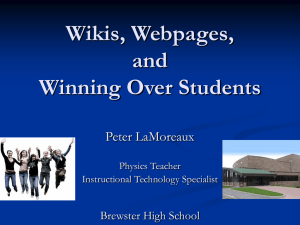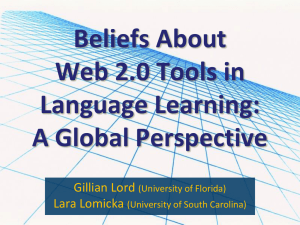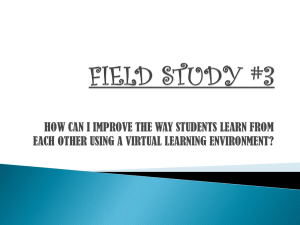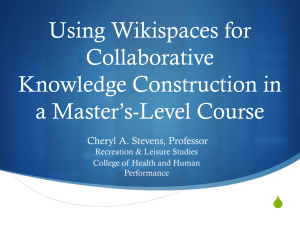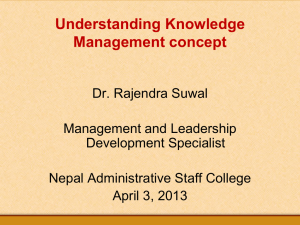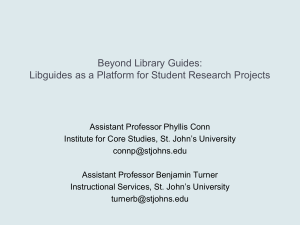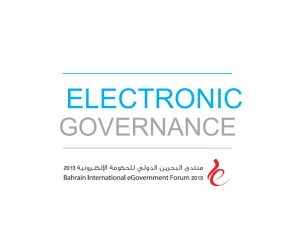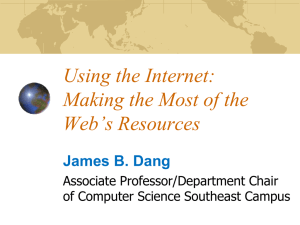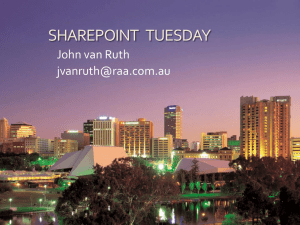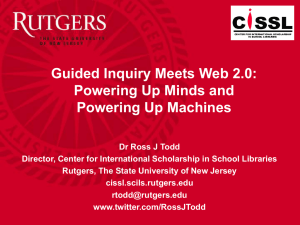My Classroom Teaching Has Been Changed So
advertisement
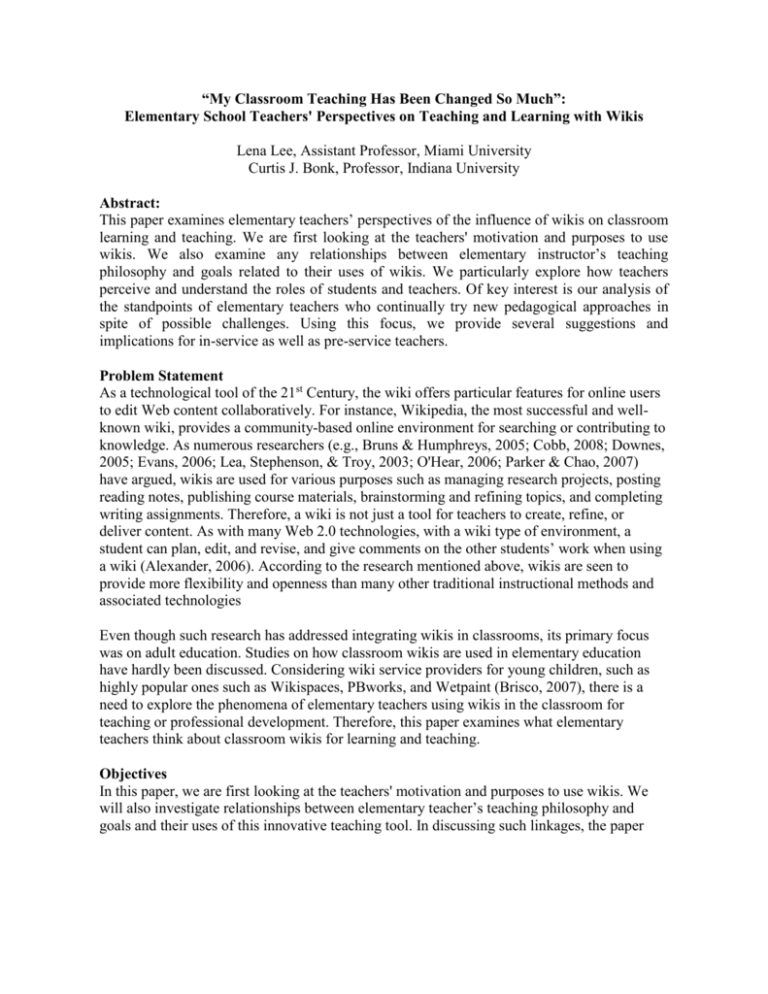
“My Classroom Teaching Has Been Changed So Much”: Elementary School Teachers' Perspectives on Teaching and Learning with Wikis Lena Lee, Assistant Professor, Miami University Curtis J. Bonk, Professor, Indiana University Abstract: This paper examines elementary teachers’ perspectives of the influence of wikis on classroom learning and teaching. We are first looking at the teachers' motivation and purposes to use wikis. We also examine any relationships between elementary instructor’s teaching philosophy and goals related to their uses of wikis. We particularly explore how teachers perceive and understand the roles of students and teachers. Of key interest is our analysis of the standpoints of elementary teachers who continually try new pedagogical approaches in spite of possible challenges. Using this focus, we provide several suggestions and implications for in-service as well as pre-service teachers. Problem Statement As a technological tool of the 21st Century, the wiki offers particular features for online users to edit Web content collaboratively. For instance, Wikipedia, the most successful and wellknown wiki, provides a community-based online environment for searching or contributing to knowledge. As numerous researchers (e.g., Bruns & Humphreys, 2005; Cobb, 2008; Downes, 2005; Evans, 2006; Lea, Stephenson, & Troy, 2003; O'Hear, 2006; Parker & Chao, 2007) have argued, wikis are used for various purposes such as managing research projects, posting reading notes, publishing course materials, brainstorming and refining topics, and completing writing assignments. Therefore, a wiki is not just a tool for teachers to create, refine, or deliver content. As with many Web 2.0 technologies, with a wiki type of environment, a student can plan, edit, and revise, and give comments on the other students’ work when using a wiki (Alexander, 2006). According to the research mentioned above, wikis are seen to provide more flexibility and openness than many other traditional instructional methods and associated technologies Even though such research has addressed integrating wikis in classrooms, its primary focus was on adult education. Studies on how classroom wikis are used in elementary education have hardly been discussed. Considering wiki service providers for young children, such as highly popular ones such as Wikispaces, PBworks, and Wetpaint (Brisco, 2007), there is a need to explore the phenomena of elementary teachers using wikis in the classroom for teaching or professional development. Therefore, this paper examines what elementary teachers think about classroom wikis for learning and teaching. Objectives In this paper, we are first looking at the teachers' motivation and purposes to use wikis. We will also investigate relationships between elementary teacher’s teaching philosophy and goals and their uses of this innovative teaching tool. In discussing such linkages, the paper particularly examines how they perceive and understand the roles of students and teachers when using this type of learning technology. In terms of educational uses, much research to date on wikis is in higher education and corporate training. In terms of the former, Langie, Lauriks, Lagendijk, and Cannaerts (2006) used wikis as an international collaborative writing space between engineering students in the Netherlands and Belgium. Dwight Allen and his colleagues at Old Dominium University have conducted a series of studies wherein undergraduate students write chapters for a wikibook that they later read (O’Shea, Baker, Allen, Curry-Corcoran, & Allen, 2007). Along these same lines, researchers at the University of Houston and Indiana University explored cross-institutional and global collaboration on wikibooks (Bonk, Lee, Kim, & Lin, 2009, 2010). They have had students critique a wikibook, edit a different one, and then write their own wikibooks. In each case, there were signs of student empowerment and an added sense of learner-centeredness. At the same time, the creation of wikibooks demanded much structure and planning. A wiki project can be a highly complex and demanding course activity. There are many issues that need to be overcome and addressed (Bonk et al; 2009, 2010; Pedro, Rieradevall, Lopez, Sant, Pinol, Nunez, & Llobera, 2006). Wikis can also be used to find information. Recent research from Head and Eisenberg (2010) indicates that college students use Wikipedia and other wiki resources as a starting point for their papers. They further point out that students use Wikipedia use it to find word meanings, obtain current information, find search terms, get explanations, and so on. Piotr Konieczny (2007) notes that given that wikis are free, reliable, and user-friendly, they can be used for many educational tasks. And in most cases, wikis epitomize socially constructed knowledge (Notari, 2006). Wikis can be used to review class notes, data collection, discussion of articles and ideas, track group project changes, virtual study groups, student feedback, group document authoring, freewriting, and many other educational activities. At the high school level, there are many educational uses as well. One key area is in writing (Bonk & Lee, 2009). Wikis record document flow according to time which can be accessed and monitored by accessing the document history. In this way, former and deleted versions of documents can be accessed. When new knowledge is found or arises, it can be negotiated and added. Wikis enable the quick addition of new information. Students can be at home or in a café and be able to add collaborate without physically meetings. And teachers can follow up on the quality of content as a document is being built. As such, a wiki is a powerful environment for collaborative composition and continuous feedback (Ebersbach, Glaser, & Heigl, 2006). Again, it is a shift in power from traditional, teacher-centered instruction to a learner-centered and social constructivistic one. In the field of elementary education, child-centered pedagogy and practices have been emphasized for more than a century. By engaging in meaningful, authentic and inquiry-based learning, young children can develop not only critical thinking skills but also ownership of their learning. In order for teachers to create a child-centered classroom, thus, it is essential to keep reflecting on their own teaching and to attempt new ways of teaching to help young children’s learning across content areas as well as support their future potential. From this perspective, we are interested in finding more information about the users of this new teaching tool and their decisions for using wikis. Specially, we aim to uncover key information related to what fostered wiki use in elementary classrooms. Such findings are critical since it is not uncommon to hear many teachers' perspectives that developing a different teaching idea or approach geared toward more meaningful learning is not easy because of the overwhelming teaching conditions in place in their everyday classroom experience. As a result, this paper is not simply focused on exploring certain characteristics or key technological functions of a new technology in the classroom. Instead, it has to do more with analyzing the standpoints of elementary teachers who continually try new pedagogical approaches in spite of possible challenges and lack of administrative support; with this focus, we provide valuable suggestions and implications for in-service teachers as well as preservice teachers. Wikis as a Change Agent For millennia, educational power has rested in the hands of teachers and schools. Taking the lead of Maria Montessori (1948; 1965) and John Dewey (1910; 1916; 1938/1997), early childhood educators for more than a century have discussed, debated, and experimented with more child-centered classroom practices. It is in forms of play, active experimentation, fun, and reflection where powerful forms of learning transpire (Rogers, 1980). Students engaged in more hands-on, authentic and project-based forms of learning build lifelong learning skills. They take leadership in these wiki-based initiatives, while envisioning audiences for their work well beyond the instructor and setting goals and milestones for task completion. Today ideas related to active forms of learning with learners assuming more ownership over their learning is seen in many Web 2.0 technologies (Alexander, 2006; Brown & Adler, 2008). Blogs foster reflective writing and interaction on ideas, podcast nurture student communication and product creation, social networking links students to experts and those with similar interests and experiences, and wikis create a playing field for idea negotiation and sharing. With YouTube, TeacherTube, SchoolTube, Link TV, NASA TV, and other shared online video, there millions of hours of educational programming at one’s fingertips (Bonk, 2008). Educational simulation and games, e-books, Web conference, and collaborative projects and technologies, extend the possibilities. Add to that, online learning portals for reading, writing, math, and science, and teachers are now faced with many choices regarding new technologies and forms of media. It becomes increasingly difficult to know where to jump in and employ a new technology. Day-to-day class activities and events challenge and at times can overwhelm the teachers already. Now children are coming to schools with increasing technology exposure and expectations. Their parents may also be demanding greater use of technologies that can prepare their children for the future. These parents may also expect greater use of technologies by teachers to share with them events and activities from the classroom. Greater communication can result in a more harmonious teaching and learning situation. Among the emerging Web technologies impacting schools today, wikis stand out as one that can epitomizes the transformation from a teacher-centered world to a more learner-centered one. Wikis can be used by teachers to simply share their knowledge and ideas. They can communicate with parents when a wiki is treated a class homepage with student projects, upcoming events, homework, and daily lessons. Teachers might embed pictures of students and class activities as well as links to videos taken. They might also include a rich array of Web resources. When such an approach is used, teachers are in control of the content. The wiki becomes an extension of the classroom. Such an approach is often called a blended approach or one wherein classroom activities are interspersed with online content, activities, and other resources. Such a use of a wiki does not require significant pedagogical change on the part of the teacher. They are still charged with lesson creation and assessment. Wikis can also be used as place for students to create, share, and remix ideas (Brown & Adler, 2008). Students can create glossaries or lists, engage in creative storytelling, and find and share online resources. They can use the Wikijunior site from the Wikimedia Foundation to write, edit, and rewrite books. They can use and even make changes to Wikipedia. They can collaborative write a short paper or document in a team. The audience for that work extends well beyond the teacher to students in other locations around the world. As with Montessori schools (Montessori, 1965), there is a generative spirit in wiki-related projects and activities. The teacher is no longer the sole supplier of knowledge for the course. Students can propose an idea or post a final project. Their actions can be reversed or modified at any time. There is no sense of knowledge permanency. Instead, knowledge is continually negotiated and added to. The teacher role might be one of scaffolding such knowledge negotiation and interaction (Vygotsky, 1978). As this occurs, the audience is not just one’s teacher, but also peers in the class, collaborators from other classrooms and schools, and anyone looking in and potentially using or sharing such content. In fact, the teacher might take a role of assister of learning, where direct instruction is part of a complex mix of instructional methods that shift quickly according to student needs and experiences (Tharp & Gallimore, 1988). As Tharp and Gallimore claim, when such an instructional conversation takes place, learning strategies and approaches are roused to life. In effect, As with many tools of the Web 2.0, when teachers use wikis, they create a culture of sharing and knowledge construction (Brown, Collins, & Duguid, 1989). They imply to the student that their teacher is caring and concerned about their learning. Why? First, content is made publicly available. Anyone can view and use it. Second, ideas communicated from the wiki website familiarize students with what to expect from the classroom setting. If they are first entering school or new to the community, they can feel more comfortable with their surroundings. Third, the use of wikis portrays a sense of openness in the classroom. A student can feel that the teacher is not traditional. Instead, she is experimenting with new technology. The classroom may not be so boring. In addition, students realize that their friends and parents can go online and find out what they are working on or have accomplished as a class. Wikis also can pose challenges to teachers. They may lack training in how to use them or adequate support in their particular school. Once created, they have to monitor the content shared and maintain the site. They also have to communicate effectively with their colleagues and supervisors their goals with such technology as well as inform parents their strategies and purposes. They are also challenged to come up with creative activities and experiences with the wiki. It must also be thoughtfully integrated into the classroom; not just use since it sounds interesting or fun. While the wiki was first generated in the mid 1990s, it took nearly a decade for wikis to find their ways into educational environments (Bonk, 2009). As indicated, most wiki research to date is in higher education settings. Research has explored power-distance relationships, issues of sabotage or trolling, team collaboration, and expert-novice differences in wiki creation and use. Some educators have experimented with wikis replacing books. Others have looked at cross-cultural and cross-institutional projects. Most of this research indicates that the use of wikis in the classroom is not particularly easy; especially in global education settings. What is clear is that one key area lacking in research is the use of wikis for early childhood education. The dearth of research with preschool and elementary youth is particularly ironic given that theory related to human learning and development seems is aligned with active and exploratory learning environments. The play activities that spring to life so naturally for young learners can naturally extend to wiki projects and ideas. In fact, if successfully deployed, wikis could serve as the bridging mechanism between preschool play and adventure-based learning and more formal school-based learning. Assuming that they can be successfully deployed in kindergarten and first and second grade classrooms, might they be used successively used in higher grade levels in this same type of learner empowering environment. If that is proven, then it is the use of wikis which might serve a highly disruptive technology in education. Wikis could be the linchpin in educational reform centered on student production, sharing, and use of knowledge. As wikis find a role in teaching and learning settings, student and teacher expectations for knowledge construction and deployment will rise. What was John Dewey and Maria Montessori discussed and debated more than a century ago, is finally possible today. Data Sources and Methodology What is lacking is an understanding of how wikis are used in preschool and early elementary environments. This study attempted to fill the gap in this research by surveying 106 elementary teachers on their use of wikis. In addition, email interviews were conducted with 17 of these teachers. To obtain this sample, a list of teachers using Wikis in the classroom was obtained from the support people at Wikispaces (which boosted more than 433,000 free K-12 wiki Websites as of April 2011). Next, we searched Teacherwikis, WetPaint, and PBwiki (now PBworks which claims to host more than 300,000 educational Websites). Using such tactics, we obtained an initial list of elementary teachers using Wikis in their classrooms. After compiling this list, we sent an email to each individual to ask their interests in participating in our survey. In addition, a few popular K-12 educators posted the research information sheet and associated link to the online survey to their blogs or websites. This approach added significantly to the number of survey respondents. The primary interest was in wiki use in early elementary classrooms, though all elementary grades were included. In some Canadian schools in the study, elementary school extended to grade seven. The online survey contained 44 items (see Appendix A). Survey items included basic demographic information (title, grade level, and previous experience with wikis) as well items related to tools used, targeted audience, motivation to use wikis in the classroom, support received, and time devoted to wiki use. The survey also asked about the ways in which students contribute to the wiki, the benefits of wikis for parents and young children, the learning approaches wikis promote, and teacher role(s) when using wikis. Several questions addressed the transformational possibilities of wikis as well as the global and cooperative educational opportunities. The 44 item survey was conducted using an online survey tool called SurveyShare. The interviews were primarily conducted via email exchanges. We asked 19 questions (see Appendix B). The exemplary questions dealt with teaching beliefs, motivation, and challenges related to the use wikis in elementary classrooms. We also inquired about collaborative activities as well as collegial and financial support. Once they wrote their responses and sent them back to the researchers, we first carefully read all of the responses. In addition, we contacted them again if there were follow-up questions to clarify or add. Results While the quantitative survey data is reported elsewhere (Lin, Lee, & Bonk, 2009), the interviews as well as the open ended questions in the survey revealed many interesting trends and perspectives that were not immediately obvious in the survey data. We elaborate on a few of them below. We also include a few of our survey results that supplement our findings. Teacher Motivation The elementary teachers in this study often created their first classroom wiki not because of their own experiences with children or perceptions of their needs for a more student centered environment. Instead, they often entered the world of wikis because of their external factors such as a requirement of a course they took in their master's program or a professional development course. However, once they created and used wikis, these teachers experienced valuable rewarding moments by witnessing their students’ increased interests in learning as well as their associated learning achievements. They also witnessed greater family participation in student learning. Moreover, they experienced enhancements in global learning connections. Increased student interest in learning, parent awareness and involvement in wiki projects, and global collaborations each are significant findings. Not too surprisingly, developing students’ creativity in learning, publishing their work, and generating ideas and information were among the central uses of wikis in the elementary classrooms we studied. Moreover, their most rewarded moments when using wikis in the classroom were closely connected to young children’s own interests as well as their resulting learning. Additional rewards occurred when school-home connections grew stronger. Such qualitative findings corresponded with the quantitative data from the surveys of these teachers. According to our survey data, their motivation for creating a class wiki revolved around myriad factors, including to lend students ownership over their learning (67.3%) and have a space to place important information found online (66.4%). Moreover, the survey results revealed that their own personal interests and professional growth (60.8%) and promoting ideas of learning communities (60.75%) were also important. When we asked what inspired them to use wikis in their classrooms, most of the teachers we have interviewed did not have specific or strong motivation which was derived from children’s responses or learning. Several teachers mentioned that they used the wikis as the result of their professional development including attending workshop and reading a book, and by observing “the other class wikis online” and “what other teachers were doing” with the Wikis. Such an opportunity allowed these teachers to learn another effective teaching tool to use in classrooms. I was instructed to create my own wikispace during a Technology Academy held at my school district this past summer. I immediately saw the benefits of the tool and continued to improve and use it after the Academy. Some of them also indicated that they used the wikis since “they are easy to use and exciting to view.” However, there were some other teachers whose motivation was more related to their teaching and children’s learning. For instance, a teacher said: I was faced with the challenge of teaching a subject that I was not particularly comfortable with. I researched ways that I could teach a writing workshop and I tried to incorporate my passion for technology into this. What I came up with was a writing workshop wiki. My goal is to have students of all ages interacting to help each other become better writers. The open ended questions revealed similar findings. These teachers are those who often “experiment to find the best tools to use with students” and “use myself [themselves].” Therefore, they experienced its effectiveness as a learning tool and knew “the students would benefit from it [using Wikis].” There were many other reasons that they gave for using wikis in their respective classrooms. Some teachers, not too surprisingly, were focused on the ease of use of the technology. For instance, one teacher stated, “I enjoy using the Wiki because it is an easy way to have a classroom website web-based projects and efolios. The students enjoy seeing their work online.” Simplicity and ease of access and use has been a common mantra in teacher technology integration for decades. In addition to functionality, some of the teachers focused on student skills learned or outcomes from wiki use. For instance, one teacher noted that, “My Wikispace serves as a support for student learning. Students are learning material faster than they would if this tool was not available to them. Administrators are always looking for ways of incorporating technology in the classroom to aid student learning.” Purpose, Subject Areas, and Skill Focus: Other teachers moved far beyond functionality concerns, speed of learning, and basic learning supports provided by wikis to ponder the future digital literacy skills demanded by society. For instance, in the open ended survey questions, one teacher claimed that, “I think technology is very important to our students. I can only imagine what their future holds in technology. I have a 6, 5, and 3 year old and I need to know how to teach them to be successful in our world and the community. Technology will be a large part of their future.” For another there were deemed benefits in expanding the classroom beyond the walls of the school. Along those same lines, another stated that there was an audience for student work beyond the teacher or school. Feedback received from outsiders was valuable to this teacher as well as her students. Along with feedback, collaboration and communication skills were mentioned by a couple of teachers. For instance, the wikis were used “to intro introduce students to that medium of communication, to “publish” their work, making their learning more authentic and allowing peers and others to provide feedback.” Most importantly, to these teachers, the wikis were considered a medium which can “take kids to places they would never otherwise be able to go.” They attempted “global collaborations’ via Wikis, which were a “tool for discovery, collaboration and communication.” The following teacher quote confirms the importance of using tools like wikis to share student work beyond the instructor. When this occurs, students have to put into action a series of skills that previously may have lay dormant or been nonexistent. The chance to spring to life creative imagination and critical analysis with such tools is bound to create a classroom culture rich with learning adventures and excitement. I believe we need to have our students display their work for others to see and provide feedback. Students need to be familiar with Web 2.0 or 3.0 sites and activities so as to improve their opportunity for success in the work world during the 21st Century. Digital natives, such as our students, are not served well with “seat time” and our pouring information into them. For one thing, we can never give them all the information they need. Secondly, we really need to teach them how to think critically, be creative/imaginative, and be able to find information which is readily available in many places today. Along with skill often comes will. One teacher noted that her kids were highly motivated to use wikis. She then added, “They are forced to think at higher levels as they construct what will appear on their wiki pages. The collaboration between my students and pre-service teachers at the local university has been wonderful!” Another added that her students “love using the wiki to post ideas, write, read, link to online resources, send mail, and post discussions about their work. They truly enjoy engaging in learning on the wiki.” Our email interviews indicated many skill areas wherein wikis can play a role in elementary education. One such area is writing. One teacher, in fact, stated, Students each have their own user name and password. They are each responsible for going through the writing process on the wiki. After they have completed rough drafts, they collaborate together to edit, revise, and finalize their writing pieces. The students are also able to put their personal writing pieces on the wiki. Parents are able to view their child’s work, but are not given writing privileges to the wiki. In effect, wikis might become a key tool for helping students understand the writing process and how revision occurs. They learn about idea generation, collaboration and sharing, and editing and refinement. As this occurs, they negotiate ideas and must defend their perspectives. Given that writing is often compared to thinking (Langer & Applebee, 1997; Scaradmalia & Bereiter, 1986), thoughtful uses of wikis as writing tools in elementary classrooms and beyond may be central to enhancements to student overall learning in this early part of the twenty-first century. Not only are wikis useful for reading and writing, but also for science, math, and other content areas. In terms of science, one teacher noted that she had her students, “collaboratively modify their own areas. Last year, I had a section on our wiki called, “Cool Science Pics” in which they could add a picture related to science, along with an explanation, and a related resource link for extra credit.” Even though Wikis had found uses in teaching social studies, math, science, writing, and technology, most of the uses were closely related to the assignments of homework or practice and student projects. They can even be used for art and music. For instance: With the chorus classes, for instance, a wiki page is set up for each choir. These pages include needed information and rehearsal tracks for each voice part and piano accompaniment. With the wiki, students can practice at home with these tracks and, thereby, become more comfortable with their part. With repeated practice, they can memorize their part and feel more confident when performing it. With such use, the wiki is an extension of the classroom and part of a blended solution to a more effective class. It also helps to individualize or tailor instruction to particular students. According to another teacher, her colleagues often use Wikis as a replacement of classroom website in that Wikis allow the teachers to “post assignments and students even participate in some of our [their] wikis by creating wiki pages to present their projects and research.” Even though teachers’ uses of wiki were various in the study, it was obvious that teaching the contents of subjects were relatively rare. Only couple of teachers discussed her actual teaching of a subject matter, equations in math, by using wiki. A teacher said: Students would explore with unifex cubes and come up with different equations to make the number of the day. Then we would come together as a class and share one of our equations that was put into the wiki via the SmartBoard. Students were encouraged and learned from each others’ equations. It also included the parental communication possibilities of wikis, which help teachers “gather parent information in real time (emphasis in the original),” and “to organize supplies for class parties, events, and conference scheduling. I do not use wikis for student use.” In encouraging such creative learning, some of the teachers adapted wikis as tools for discovering, building, and sharing knowledge with the outside world, which is challenging with a conventional way of classroom teaching. The wikis allowed them to support class collaboration and communication with other classes around the world. As a teacher discussed, therefore, they enabled to “take kids to places they would never otherwise be able to go!” by means of using wikis. To some teachers, the shift to global collaborations—particularly those in science and social studies—from first using wikis for teacher professional development provided their students to be exposed to “all other the world to work together and teach each other about their communities and environments,” as one of the teachers put it. As a result, developing students’ creativity in learning, publishing their work and generating ideas and information seemed focused in using classroom wiki in the study. Rewarding However, this study showed that their most rewarded moments using Wikis, which were closely connected to children’s interests, learning, and school-home connection. The most rewarding part of wiki use is in the motivation and pride our students take in using it. As our 4th grade class worked on their part of the story the willingness to work together was there. They were also motivated to go back and check the progress of the story week by week until the eight week period was over. It was a projected they won’t soon forget. Several teachers told us that their rewarding moments were “when I see students proud and excited about the work they are creating,”; “seeing a student smile in ownership of a successful project that others acknowledge as quality”; “when students continue being engaged and excited beyond the bell.” In addition, some teachers considered the rewards of using wikis collaboration among teachers, students, and families. This collaboration has had a global connection. As a teacher said, working with people “around the world” was truly valuable to these teachers: The most rewarding experience has been responses from a set of grandparents in India who were able to email and talk with their grandchild about what was happening at school each week here in America. It was so powerful and experience for him, that he wrote about it often and he and his grandfather wrote a book together about life through the eyes of a 7 year old and a 70 year old. This was all sparked from conversations started from pictures and events posted on the wiki. As a result, the teachers whom we interviewed often created a classroom wiki not because of their own experiences with children, but merely because of their external factors such as a requirement of a course they took. However, once they created and used the wikis, all of the teachers experienced valuable rewarding moments by witnessing their students’ improvement and interests in learning, family participations, and global connections. In particular, many teachers in this study indicated that their students felt empowered and had ownership of their learning when participating in a classroom wiki. More precisely, they wanted to engage and challenge learners, make learning relevant as well as fun, expose their students to wide experiences, and create environments that were collaborative. They also were focused on developing learning situations that were welcoming and respectful of student diverse backgrounds and experiences. From this perspective, these teachers tended to take in account the student’s developmental readiness for such empowering learning moments with wikis as well as the importance of their families and cultures in using wikis in their classrooms. In considering young children's families and cultures, the teachers also understood that their students' lives are not limited in a local community, small city, or even to the United States. Rather, their lives extended to different cities and countries. Therefore, the teachers realized that the use of wikis in the classroom was considered an important and necessary tool for them to maintain and develop their students' own sense of family, culture, and identity. According to the survey data, over 95% of the participants also considered that teachers can offer global educational opportunities with wikis that were not previously possible. Such a use of wikis as tools for discovering, building, and sharing knowledge with the outside world also made their teaching exciting and different, unlike more conventional ways of classroom teaching. These unique opportunities for learning and collaboration at early grade levels can perhaps be built upon in later grades and learning situations. While a single technology like a wiki cannot transform education by itself, it can be held as a signal of what is possible with Web 2.0 technologies (Alexander, 2006). External Communication Public wikis allow for greater teacher sharing with other teachers in their own building and around the planet. They also open their classroom practices to the world to peek in on (Bonk, 2009). In fact, as the following quote reveals, parents and even grandparents can learn what is happening. I only made it for a class I was teaching. I have expanded and added more things to the sight due to the response I have gotten from parents, and grandparents, about how it gives them things to see and discuss with their kids. I get lots of responses from extended families out of state who now have something concrete to discuss with their kids in my class. Another noted the parent-teacher communication is enhanced with wikis. In fact, they create new communication paths for all educational stakeholders—parents, teachers, administrators, local community members, and students. Wikis facilitate in teacher-student-parent interaction and discussion. It allows information to be easily passed on between these parties. It also creates a great outlet for sharing student work. As this happens, students work can be elevated. There might not only be new collaborations but also competitions and increased standards of success. Parents get to easily see what we are doing in class. Students have an easy way to be creative and showcase work. Students also have a way to collaborate outside of the classroom. I find the ease of having all work in one place beneficial. Training and Professional Development There were many purposes related to the use of wikis for teaching and learning in elementary classrooms. For many, their chief purpose was to prepare their in-service teacher training, professional development workshops, and graduate courses. Some of these teachers used the wikis “to share links and resources with both students and teachers,” “for parent communication,” and “for math.” Therefore, as a teacher indicated, they use wikis with “multiple” purposes: Teachers use them for classroom web pages that are useful to the students and parents. Teachers post assignments on the wikis and students even participate in some of our wikis by creating wiki pages to present their projects and research. We also use wikis to organize internet content. We call these our content wikis and they cover all subject areas. Finally, we use wikis for professional development. Wikis are created to provide technology based resources for our staff. We even organize our wikis on a wiki. For some, this training can extend from the school district level to the state and beyond. In fact, a wiki tool might be used to help connect instructional approaches from a single school or district to others at the other end of the state or country. Comparisons and suggestions can be made across sites. The following quote illustrates how wikis can be used for local as well as statewide collaboration. As I’ve stated we will continue to use wikis as a professional development and inschool collaboration tool for our instruction, and for use in procedures running our school. On the instructional side we will strive to implement projects state-wide (with the help of our instructional technology department) and globally. Teacher Role and Beliefs In this study, many teachers viewed themselves as guides, mentors, role models, and leaders. They find resources and materials and facilitate student learning of them, instead of relying on “work sheet” based instruction. Some not only facilitated, but also encouraged their students' collaborative learning as well as advocated for their students' own interests in learning. The survey data also revealed that the types of student learning intended were cooperative learning (27%), student-centered or individualized learning (22%), and exploratory or inquiry learning (20%). The teachers interviewed in this study declined the common sage on a stage role for one that entails more guidance and support. These teachers, therefore, viewed their students as more active in their own learning. From their perspective, the roles that their students played in the classroom included terms such as explorer, leader, collaborative and cooperative, and confident independent learners. Clearly, such personal teaching philosophies mesh well with the use of wikis and other Web 2.0 technologies. In the preliminary findings presented above, participants' values and beliefs of teaching and learning were closely related to the use of class wikis in elementary classrooms. We investigated teacher participants’ motivations to create wikis as well as the extent to which students and parents were involved in wiki activities. Challenges As with any technology or new approach to instruction, the use of wikis in the classroom is not without problems, challenges, and obstacles. First, not only is there the issue of teacher initial resistance or hesitancy to use a technology for learning, but when they cede control of learning to the students, there is even greater trepidation and challenge (Tharp & Gallimore, 1988). Exacerbating these fears is the lack of time in their schedules. The quote below illustrates this well. There is always a fear factor when teachers question if they can learn something new, but we have the best way to implement these types of tools is to jump in and use them. Our experience in the last year has been that teachers who were not comfortable using technology have grown much and are not afraid to any more. Time to learn and implement will always be a challenge, as will teachers who don’t want to change the ways they are teaching and implement wikis. Time is a factor not only in training or understanding the potential of wiki in education, but also in maintaining student or instructor wiki sites and activities. As per below, one teacher also faced difficulties since she wanted to train parents in the use of wikis. I feel that the most challenging aspects of using a wiki is finding the time to maintain it consistently and getting more student and parent involvement. I’ve also come across problems with formatting on the actual page that at times is very frustrating. Of course, standardized curriculum practices and testing schedules constrain the time available for innovative uses of learning technologies such as wikis. As the following quote makes explicit, teachers want to experiment with wikis as a classroom activity, they just have scant time for doing so. The biggest challenge is the lack of time! The sheer volume of tested objectives for the subject I teach prevents me from doing many of the cool things I’d like to do. While I do incorporate Web 2.0 things like wikis during the school year, it’s nothing compared to the amount of incorporation I do after the test is over! Still other barriers relate to computer access at home for students and parents. And, as noted below, even when access exists, many students lack the necessary reading and writing skills to take advantage of wikis. The main challenges are that some parents do not have internet access and those that don’t (approximately 5-7% of our parent population this year) has no interest to go to a public library to use a computer. Another challenge is that little kids aren’t fluent enough readers and writers to make their writing easily legible to post ideas or opinions on a Wiki. And, finally, there are technology concerns. While wikis are promoted as a technology that is easy to learn and use, that is often not the case. In fact, many people who design and use wikis come from the computer science field. They are frequently not as simple as the promoters contend. Some of the tools do not always function quite as we would like them for examples inserting images in our wiki is sometimes problematic. Some of the Web 2.0 technologies that we would like to make use of are blocked by our proxy server. Conclusion and Implication In this paper, we only presented a part of our research findings; mainly our qualitative results. In relation to these findings, we will discuss additional issues in our presentation such as the benefits of integrating wikis in elementary classrooms, the difficulties these teachers encountered, and the technical and other supports they received from their respective schools. As expected, they wants to engaging and challenge learners, make learning relevant as well as fun, expose their students to wide experiences, empower the learner, and create environments that were collaborative as well as welcoming and respectful of student diverse backgrounds and experiences. One of the interviewees seems to agree with this stance, as follows: We just started using Wikis this year, and we have used them to help us For example, we set up parent conference sign-ups and potluck dinner sign-ups on our Wiki. As far as using them with students, we haven’t done that yet. Many of our students are not fluent readers and writers yet, so using a Wiki to post ideas or opinions would not be an independent job at this point in their early primary experience. What this seems to imply is that teachers must take in account the student’s developmental readiness for the use of wikis in the classroom. Some uses may simply be beyond their attained competencies. Given such comments, it may be important to have examples of wikiappropriate activities for different age groups or levels as well as within different disciplines. For this to happen, there needs to be a change in the role of teachers. The time is ripe for that to happen. There are myriad Web 2.0 technologies for learning, many of which are free and easy to use. There is an emphasis on school reform as well as active student learning. And there is much experimentation today at the intersection of thoughtful pedagogy and emerging technologies for learning. Limitations As with any study, and in particular, those addressing a new learning technology or educational movement, there are numerous limitations. First, we relied solely on surveys and interviews. Both are self-report data. We did not specifically explore the wiki Websites of the 106 people participating in this study. In fact, a follow-up study on just a 10-12 of their Websites would prove illuminating. A second problem is in our solicitation of participants. Initially, we had intended to rely on finding K-6 wikis uses in Wikispaces and WetPaint and solicit participation from those individuals. When we did that, however, our response rate was low. Consequently, we solicited support from a few educational leaders in the Web 2.0 and wiki areas. Their endorsement and sharing of our survey link significantly increased our response rate. As such, our participants were likely from a population that, to some degree, has similar interests and experiences. Third, we have yet to conduct follow-up phone interviews or focus groups with the participants. Such additional research may reveal nuances of using wikis in the elementary classrooms. Fourth, we have yet to compare lower elementary classrooms to upper elementary. It is highly plausible that teachers in grades K-3 are using wikis in vastly different ways from those in grades 4-6 or 7. Research Significance This study examines the elementary school teachers' ideas and uses related to wikis as a learning tool. How elementary classroom teachers use wikis to enhance learning has been an open question since most published research on wiki use is focused on older students. As a result, the findings here can perhaps enlighten teachers, administrators, and instructional designers about the developmental possibilities of wikis in K-12 schools as well as how technology can mesh with current learning theory related to collaboration, constructivism, and global communication. At its core, this study is significant to understand how such tools can work in the classrooms of young children to enhance or augment their learning. In this manner, this study meets a need to explore the phenomena of elementary teachers’ using wikis in the classroom. It also contributes to improve in-service teachers’ instructional quality and helps in the development of more engaging and powerful curricula for young children’s learning. Finally, as new approaches to teaching and learning are seen as vital to changing education, this study can provide great benefit not only to elementary educators, but also to the surrounding community and society as a whole. There is a growing need for teachers to thoughtfully integrate emerging technologies for learning in their classrooms. Students are increasingly coming to school with technological tools and knowledge that can be put to use. They might have a mobile phone, a blog page, a Facebook account, or a laptop computer from which to produce their own podcast performances or create digital movies. They might rely on social networking and text messaging for peer support and homework assistance. Clearly, digital literacy skills are increasing in importance. Teachers and schools need visions and plans for how such technology tools and resources. Wikis can play a vital role in this emerging social networking culture which shifts schools from reliance on teacher-centered instruction to a more active and engaging, learner-centered one. We are just at the start of beginning point of massive changes in education. Clearly, early elementary and even preschool teachers and technology assistants who experiment with wikis in the classroom for student empowering, parental communication, or teacher sharing and collaboration, will be providing a base from which other teachers in later years can build upon. The teamwork, reflection, debate, negotiation, and brainstorming sessions of today will pay huge dividends in the future. This study illustrates that such wiki-based experimentation is happening today. Future Directions This is but one study into a brand new form of education; one with hope toward empowering both students as well as teachers. There remain many open questions related to wiki use in K12 settings. Some researchers might want to explore wiki uses in specific content areas. For instance, they might be interested in how wikis can foster reading and writing skill development. Others might dig deeper into skills needed in this digital age. They might focus on collaboration skills, critical or creative thinking, and motivation to learn. A third area that might be of interest is greater understanding of highly student-centered classrooms. How might elementary students be encouraged to generate their own wikis and wiki-based projects in a highly security conscious society? Alternatively, researchers might more simply look at student knowledge generation and sharing practices in a teacher-designed wiki. For those who are more ambitious, they might look at interaction, negotiation, and collaboration across two or more classes engaged in a wiki project. Those are just a few studies. Each area has dozens of potential projects that can aid in teachers and administrators in understanding the role of wikis and Web 2.0 technologies in general in curriculum practices and school reform efforts. Wikis are one technology that offers links progressive pedagogy and learner-centered practices to ideas about technology integration in the twenty-first century. Wiki use is situated at the intersection of technology and pedagogy. But educators must also keep in mind the society, people, and culture using a wiki in education. These are exciting times. More creative classroom experimentation is needed as well as research on such approaches. References Alexander, B. (2006, March/April). Web 2.0: A new wave of innovation for teaching and learning? EDUCAUSE Review, 41(2), 32-44. Retrieved April 7, 2010, from http://www.educause.edu/EDUCAUSE+Review/EDUCAUSEReviewMagazineVolume 41/Web20ANewWaveofInnovationforTe/158042 Bonk, C. J. (July 2009). The World is Open: How Web Technology is Revolutionizing Education. San Francisco, CA: Jossey-Bass, a Wiley imprint. Bonk, C. J. (2008, March). YouTube anchors and enders: The use of shared online video content as a macrocontext for learning. Paper presented at the American Educational Research Association (AERA) 2008 Annual Meeting, New York, NY. Retrieved April 7, 2011, from http://www.publicationshare.com/SFX7EED.pdf Bonk, C. J., Lee, M. M., Kim, N., & Lin, M.-F. (2010). Wikibook transformations and disruptions: Looking back twenty years to today. In H. H. Yang, & S. C-Y. Yuen (Eds.), Collective intelligence and e-learning 2.0: Implications of Web-Based Communities and Networking (pp. 127-146). Hershey, PA: Information Science Reference. Bonk, C. J., Lee, M. M., Kim, N., & Lin, M.-F. (2009, December). The tensions of transformation in three cross-institutional wikibook projects. The Internet and Higher Education, 12(3-4), 126-135. Brown, J. S., & Adler, R. P. (2008, January/February). Minds on fire: Open education, the long tail, and learning 2.0.EDUCAUSE Review, 43(1), 16−32 Retrieved April 7, 2011, from http://connect.educause.edu/Library/EDUCAUSE+Review/MindsonFireOpenEducation t/45823 Brown, J. S., Collins, A., & Duguid, P. (1989). Situated cognition and the culture of learning. Educational Researcher, 18(1), 32−41. Brisco, S. (2007). Which wiki is right for you? School Library Journal. Retrieved September 4, 2009, from http://www.schoollibraryjournal.com/article/CA6438167.html Bruns, A., & Humphreys, S. (2005). Wikis in teaching and assessment: The M/Cyclopedia project. Paper presented at the WikiSym 2005. Retrieved March 5, 2009, from http://www.wikisym.org/ws2005/proceedings/paper-03.pdf Cobb, J. (2008). Learning 2.0 for associations: Mission to learn. Retrieved September 20, 2009, from http://blog.missiontolearn.com/files/Learning_20_for_Associations_eBook_v1.pdf Dewey, J. (1916). Democracy and education: An introduction to the philosophy of education. New York: Macmillan. Dewey, J. (1938/1997). Experience and education. Macmillan. Dewey, J. (1910). How we think. Lexington, MA: D.C.: Heath. Downes, S. (2005). E-Learning 2.0. ACM eLearn Magazine . Retrieved July 18, 2009, from http://www.elearnmag.org/subpage.cfm?section=articlesAmp;article=29-1 Ebersbach, A., Glaser, M., & Heigl, R. (2006). Wiki: Web collaboration. Germany: SpringerVerlag Berlin Heidelberg. Evans, P. (2006, January/February). The Wiki factor. BizEd, 28-32. Retrieved November 23, 2008, from http://www.aacsb.edu/publications/Archives/JanFeb06/p28-33.pdf Head, A. J. & Eisenberg, M. B. (2010, March). How today’s college students use Wikipedia for course-related research, First Monday, Volume 15, Number 3 - 1. Retrieved April 7, 2011, from http://www.uic.edu/htbin/cgiwrap/bin/ojs/index.php/fm/article/view/2830/2476 Konieczny, P. (2007, January). Wikis and Wikipedia as a teaching tool. International Journal of Instructional Technology and Distance Education, 4(1), 15-34. Retrieved on April 7, 2011, from http://itdl.org/Journal/Jan_07/article02.htm Langer, J. A., & Applebee, A. A. (1987). How writing shapes thinking. Urbana, IL: National Council of Teachers of English. Langie, G., Lauriks, W., Lagendijk, E., & Cannaerts, M. (2006). International peer assisted coaching in a collaborative writing project using wikis. Retrieved April 7, 2011, from http://www.eadtu.nl/proceedings/2006/Full%20papers%20parallel%20sessions/Langie% 20Lauriks%20et%20all%20%20International%20peer%20assisted%20coaching%20in%20a%20collaborative%20w riting%20project%20using%20wikis.pdf Lea, S. J., Stephenson, D., & Troy, J. (2003). Higher education students' attitudes to student centred learning: Beyond ‘educational bulimia.' Studies in Higher Education, 28(3), 321-334. Lee, H., & Bonk, C. J. (2010, October). The Use of Wikis for Collaboration in Corporations: Perceptions and Implications for Future Research. Proceedings of E-Learn 2010— World Conference on E-Learning in Corporate, Government, Healthcare, and Higher Education (pp. 2581-2587), Chesapeake, VA: AACE. Lin, C.-Y., Lee, L, & Bonk, C. J. (2009, June). Teaching Innovations on Wikis: Practices and Perspectives of Elementary School Teachers. Proceedings of the Ed-Media 2009— World Conference on Educational Multimedia, Hypermedia, and Telecommunications in Honolulu, Hawaii (pp. 1625-1630). Chesapeake, VA: Association for the Advancement of Computing in Education (AACE). Montessori, M. (1965). Dr. Montessori's Own Handbook: A Short Guide to Her Ideas and Materials. New York: Schocken Books. Montessori, M. (1948). To Educate the Human Potential. Madras, India: Kalakshetra Publications. Notari, M. (2006). How to use a wiki in education: ‘wiki based effective constructive learning’. Proceedings of the 2006 international symposium on Wikis (WikiSym ’06, Odense, Denmark), 131-132. Retrieved April 7, 2011, from http://delivery.acm.org/10.1145/1150000/1149479/p131notari.pdf?key1=1149479&key2=8005222031&coll=DL&dl=ACM&ip=156.56.194.12 2&CFID=15449515&CFTOKEN=53566134 O'Hear, S. (2006). E-learning 2.0: How Web technologies are shaping education. Retrieved October 11, 2009, from http://www.readwriteweb.com/archives/e-learning_20.php O’Shea, P., Baker, P., Allen, D., Curry-Corcoran, D. E., & Allen, D. (2007, Winter), New levels of student participatory learning: A WikiText for the introductory course in education, Journal of Interactive Online Learning, 6(3). Retrieved April 7, 2011, from http://www.ncolr.org/jiol/issues/viewarticle.cfm?volID=6&IssueID=21&ArticleID=110 and http://www.ncolr.org/jiol/issues/pdf/6.3.5.pdf Parker, K. R., & Chao, J. T. (2007). Wiki as a Teaching Tool. Interdisciplinary Journal of Knowledge and Learning Objects, 3, 57-72. Pedro, X., Rieradevall, M., Lopez, P., Sant, D., Pinol, J., Nunez, L., & Llobera, M. (2006). Writing documents collaboratively in higher education using traditional vs. wiki methodology (I): qualitative results from a 2-year project study. Retrieved February 17, 2008, from http:// uniwiki.ourproject.org/dl93. Rogers, C. R. (1983). Freedom to learn for the 80s. Columbus, OH: Charles E. Merrill Publishing Company. Scardamalia, M., & Bereiter, C. (1986). Research on written composition. In M. C. Wittrock (Ed.), Handbook of research on teaching. (3rd ed., pp. 778-803). New York: Macmillan Education Ltd. Tharp, R., & Gallimore, R. (1988). Rousing minds to life: Teaching, learning, and schooling in social context. New York: Cambridge University Press. Vygotsky, L. (1978). Mind in society. Cambridge, MA: Harvard University Press. Appendix A. Survey Questions for Wikis in Elementary Classrooms Project. 1. What is your title/occupation? (Teacher; parent; administrator; curriculum specialist; technology coordinator; department head; librarian; other—Please specify) 2. What grade level do you teach? (Please check all applies; pre school; kindergarten; first grade; second grade; third grade; forth grade; fifth grade; sixth grade; others – please specify) 3. What is your primary teaching goal in general? (To teach important subject areas; to build children’s social skills; to provide developmentally and culturally appropriate practice; to encourage children to construct knowledge; to create a respectful learning environment; other—Please specify) 4. What are your primary teaching goals when using wikis in the classroom? Check all that apply. (To build children’s social skills, To create a respectful learning environment, To encourage children to construct knowledge, To provide developmentally and culturally appropriate practice, To teach important subject areas, other—please specify) 5. How long have you been using wikis for educational purposes? (less than one month; 1-3 months; 4-6 months; 6 months to 1 year; 1-2 years; more than 2 years) 6. Have you had experiences with other Web 2.0 technologies in your classroom? (Yes, No) 7. In addition to wikis, have you had experiences with other Web 2.0 technologies in your classroom? 8. If you had experiences in using other Web 2.0 technologies in your classroom, please indicate what types. Check all that apply. (blogs, collaboration tools e.g. Yahoo Groups or Google Docs, Online albums, podcasts, social bookmarking sites (e.g. Delicious.com), social networking sites (e.g. MySpace.com or Facebook), virtual world (e.g., Second Life), I didn’t use any of the above in my classroom) 9. Which wiki(s) do you currently use? Check all that apply. (Wikispaces; PBwiki; Wetpaint; I don’t use wikis anymore; others—Please specify) 10. Who created the wiki that you are using? (Teacher; administrator; other teacher; technical support in school; students; parents; others—Please specify) 11. Who created the majority of the content on the wiki? (Teacher; other teachers; parents; students; administrators; community members; others—Please specify ) 12. How often do you spend creating and managing wiki content and structure? (More than one time per day; one time per day; about once a week; once a month; less than once a month; never) 13. Who is the primary target audience (or major participants) of the wiki? Check all that apply. (Colleagues and teacher communities; students; parents; administrators; preservice teachers; general public (anyone); others—Please specify) 14. Who is the secondary target audience (or participants) of this wiki? (Colleagues and teacher communities; students; parents; administrators; pre-service teachers; general public (anyone); others—Please specify) 15. Do your students contribute to the class wiki? (Yes. No.) 16. If your students contribute to class wikis (if your answer of the number 15 above is “yes”), when do they usually contribute? (Mostly during class; during class and other time at school; mostly after class; both during the class as well as when at home; other—Please specify) 17. If your students participate in the class wikis (if your answer on the number 15 above is “yes”), how do they contribute? Please check all that apply (read; comment; add content on wiki pages; add, delete, and edit content on wiki pages; create new wiki pages; organize documents or folders on wikis; other—Please specify) 18. How do parents contribute to the Wiki? Please check all that apply (e. g., read; comment or post feedback in discussion; add content on wiki pages; add, delete, and edit content on wiki pages; organize documents or folders on wikis; others)? 19. What responses do parents have when you use wikis? Check all that apply. (Curious/ interested, happy/ have fun, supportive, frustrated, indifferent, overwhelmed, worried, I do not know parents’ responses/ parents are not involved; other—please specify) 20. What responses do students have when you use wikis? Check all that apply. (Curious/ interested, happy/ have fun, supportive, frustrated, indifferent, overwhelmed, worried, I do not know / students are not involved; other—please specify) 21. What responses do your colleagues have when you use wikis? Check all that apply. (Curious/ interested, happy/ have fun, supportive, frustrated, indifferent, overwhelmed, worried, I do not know; other—please specify) 22. How much are the contributors to your wiki involved in it? (Less than I expect, more than I expect, about the same) 23. What is your major role in the wiki? (Host; content provider; editor or manager; guide or facilitator; other—Please specify) 24. What were your initial goals or motivations for creating a class wiki? (Give students ownership over their learning; sharing content and ideas; having a space to place important information found online; communicating with parents; personal interest and growth (e.g., being interested in technology and exploring more novel and effective instructional ideas); heard that wikis are useful and want to try them; create exchange program with another school or multiple schools; having support from the school; other—Please specify) 25. What motivates you now to continue the efforts? (Text box) 26. Which of the following learning areas do wiki best promote (pick one)? (Creativity; Critical thinking; Literacy; Problem solving; Social skills; Sciences/Math) 27. Which of the following learning formats do wiki best support (pick one)? (Authentic learning; Cooperative learning; Exploratory/Inquiry learning; Participatory learning) 28. Has your classroom learning, teaching or environment been significantly changed or transformed from using wikis in instruction? (No; Yes) 29. Teachers can offer global educational opportunities with wikis that were not previously possible. (No; Yes) 30. Teachers can offer cooperative learning activities with wikis that were not previously possible. (No; Yes) 31. I feel that my use of wikis has contributed to my professional growth as a teacher (No; Yes) 32. Wikis offer just more of the same old boring, drill and practice type of curriculum? (No; Yes) 33. Do Wikis represent a learning revolution in the education of young children? (No; Yes) 34. If you want to improve school retention and motivation, are wikis part of the solution? (No; Yes) 35. How long will it take for wikis to transform K-12 education? (It is happening right now!; 1-2 years; 3-4 years; 5-10 years; More than 10 years; Never—there is no hope in wikis.) 36. What difficulties have you encountered in using wikis? Check all that apply. (Lack of student familiarity with wikis; lack of teacher training; parental complaints; lack of administrative support; insufficient computing facilities; lack of time; undefined time framework (e.g., lasting only one year, existing for only one project or/and event, etc.); inappropriate to children’s developmental level; most of the generated content is not useful; hard to maintain; technology itself is frustrating and difficult; other— Please specify) 37. How do you overcome the challenges listed above? Check all that apply. (Receive training; provided more support aids or instructions for students; write to the software company; communicate with the parents; ask a principal for help; talk to colleagues; buy books or go to conferences; give up; other—Please specify) 38. Do you have support from your school or community regarding creating and using the wikis? (Yes. No.) 39. What are the benefits of using wikis with young children? Check all that apply. (Help them become producers of content (ownership and leadership of their learning); show their personal growth over time; encourage them to be familiar with technology; provide more learning motivation and fun to children; fosters collaboration and sharing; their parents learn more about what happens in school; other—Please specify. 40. What are the benefits of wikis for your teaching? (Share knowledge that I find with my students; encourage students to share their learning; encourage children to be familiar with technology; provide more learning motivation and fun to children; invite a variety of community guests to provide information; encourage students to interact with the other schools’ students; share ideas with other teachers; personal action research so that I can improve my teaching or share the results with others; other— Please specify) 41. What are the benefits of wikis for the parents? Check all that apply. (Help them become producers of content (sharing teaching); have better understanding their children’s learning and learning environment; communicate with the teachers; sharing information with the other parents and community; other—Please specify) 42. If you have any other comments, please provide here. 43. We would like to interview some of the survey respondents for more information on how they use wikis in the classroom. If you would like to participate, please provide your name and contact information. 44. Would you like to have the final report of this study? If so, please give us your email address. Appendix B. Interview Questions for Wikis in Elementary Classrooms Project (note: these questions were sent via emai). Please let me know what grade/age level you teach: 1. What are your goals of education/teaching? Or/and what is your philosophy of education? 2. What roles do children play in your classroom? 3. What do you think about the roles of parents? In what degree is there parental involvement in your classroom? 4. What do see as your role(s) as a teacher? 5. What purposes do you have to use wikis? What subject areas/contents do you use wikis? 6. How does your use of wikis fit with your educational goals and your role(s) as a teacher? 7. Have you experienced learning through wikis or any other technology in your previous teacher education coursework? If so, could you explain what happened? If not, how did you learn about this? 8. What do you think about wikis or the other types of learning technology in general? 9. What inspired you to use wikis in children’s learning? 10. How do the children participate in the use of wikis in your classroom? Are there any other people who participate as well? 11. What specific strategies do you use to encourage young children to get involved in wikis? Can you provide a specific story or example of what you do? 12. What types of collaborative and collegial support do you have in developing/maintaining wikis? For instance, is there peer collaboration (among students as well as teachers)? What types of collaboration are supported (e.g., colleagues, school, community, etc.)? 13. What types of financial resources do you have for developing and maintaining wiki projects in your classroom? 14. What are the challenges in using wikis and how do you overcome those? And how do you overcome these? (or what sources of support do you have for overcoming these?) 15. What are the benefits in using wikis for you, students, and parents? 16. What subject area(s), learning domain(s), or learning activities do you find difficult incorporating in your wiki? And why? 17. What is the most rewarding moment or the best experience of you in using the wikis? 18. In order for teachers to use technologies such as wikis in classrooms more effectively, what is needed? 19. What is your future plan for using wikis in the classroom?
